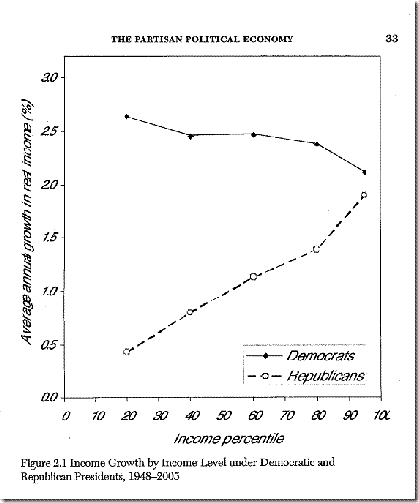This is getting to be the most reproduced figure in the blogosphere

and I have to lecture about the political economy of income distribution TODAY.
I really don't think I can just go with last years lecture. I will show my students the graph, but then they will ask me how it is possible.
Alarmingly Paul Krugman doesn't have an explanation
"Now, I’m a big Bartels fan; I’ve known about this result for quite a while. But I’ve never written it up. Why? Because I can’t figure out a plausible mechanism."
Uh oh.
I think I'm going to go with this. A large factor in income distribution is the social norm, the sense of what is fair. This affects actual pay, because pay is determined by the Akerlof Yellen type morale consideration, that is it is in firms interest to pay workers a salary which the workers consider fair.
A change in attitudes about equality and fairness drives wages and presidential elections.
Sociology is the last refuge of the totally confused economist.
update: I considered Ezra Klein's explanation -- that the President sets social norms (honest really I did). However, like Klein, I found the causation in the other direction more plausible.
I had a great example for my class (in Italy). The recently deceased Prodi government had one pleasant experience -- Surprisingly high tax revenues called the tesoretto (little treasure). I think it is clear what happened. Silvio Berlusconi,k Prodi's predecessor, is Italy's biggest tax cheat (by far, absolutely proven, and resulting in mega fines by his firm and no conviction for him). I think it is clear that when a tax cheat (who defended tax fraud in principle when under oath) is prime minister, tax revenues are depressed by people following his example.
Sadly, I didn't manage to slip it into my lecture, because I didn't stick to schedule and only had 10 minutes left when I got to Bartels' graph.
Has anybody produced 'Bartels' pictures for other countries?
ReplyDelete